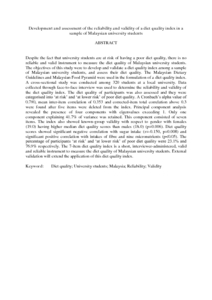Citation
Fokeena, Waqia B. and Rosita Jamaluddin, Rosita and Huzwah Khaza’ai, Huzwah
(2016)
Development and assessment of the reliability and validity of a diet quality index in a sample of Malaysia university students.
Journal of Food and Nutrition Research, 4 (4).
pp. 251-257.
ISSN ESSN: 2333-1119
Abstract
Despite the fact that university students are at risk of having a poor diet quality, there is no reliable and valid instrument to measure the diet quality of Malaysian university students. The objectives of this study were to develop and validate a diet quality index among a sample of Malaysian university students, and assess their diet quality. The Malaysian Dietary Guidelines and Malaysian Food Pyramid were used in the formulation of a diet quality index. A cross-sectional study was conducted among 320 students at a local university. Data collected through face-to-face interview was used to determine the reliability and validity of the diet quality index. The diet quality of participants was also assessed and they were categorised into ‘at risk’ and ‘at lower risk’ of poor diet quality. A Cronbach’s alpha value of 0.780, mean inter-item correlation of 0.353 and corrected-item total correlation above 0.3 were found after five items were deleted from the index. Principal component analysis revealed the presence of four components with eigenvalues exceeding 1. Only one component explaining 41.7% of variance was retained. This component consisted of seven items. The index also showed known-group validity with respect to gender with females (19.0) having higher median diet quality scores than males (18.0) (p=0.006). Diet quality scores showed significant negative correlation with sugar intake (r=-0.150, p=0.008) and significant positive correlation with intakes of fibre and nine micronutrients (p<0.05). The percentage of participants ‘at risk’ and ‘at lower risk’ of poor diet quality were 23.1% and 76.9% respectively. The 7-item diet quality index is a short, interviewer-administered, valid and reliable instrument to measure the diet quality of Malaysian university students. External validation will extend the application of this diet quality index.
Download File
![[img]](http://psasir.upm.edu.my/55484/2.hassmallThumbnailVersion/Development%20and%20assessment%20of%20the%20reliability%20and%20validity%20of%20a%20diet%20quality%20index%20in%20a%20sample%20of%20Malaysian%20university%20students.pdf)  Preview |
|
PDF (Abstract)
Development and assessment of the reliability and validity of a diet quality index in a sample of Malaysian university students.pdf
Download (188kB)
| Preview
|
|
Additional Metadata
Actions (login required)
 |
View Item |

